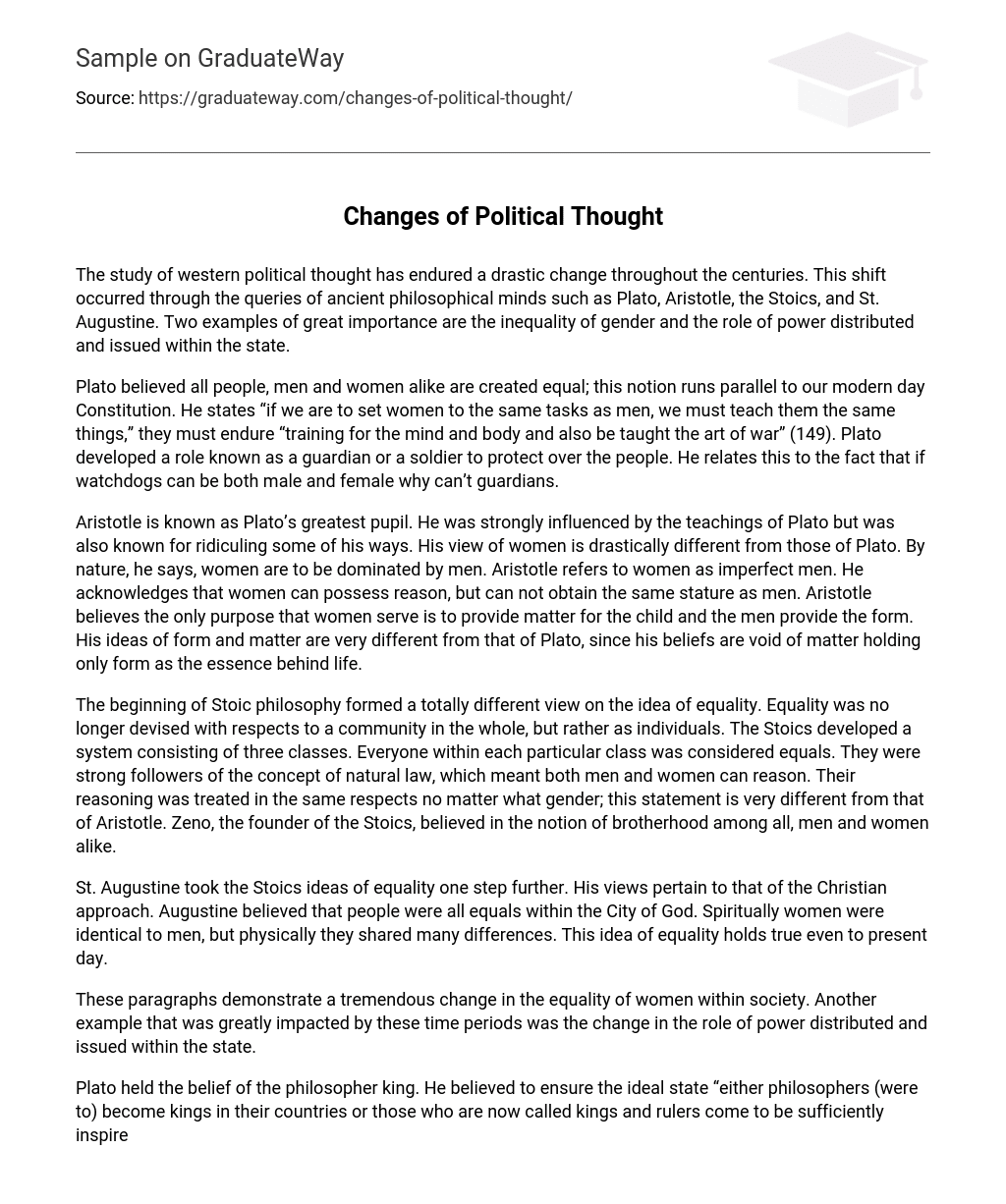The study of western political thought has undergone significant transformations over time, influenced by ancient philosophers like Plato, Aristotle, the Stoics, and St. Augustine. Two key areas that have emerged in this development are gender inequality and power distribution within the state.
Plato advocated for gender equality, akin to our present Constitution, proposing that women should be afforded equal education and training as men. This encompasses both mental and physical exercises, along with instruction in the art of war. Plato introduced the concept of guardians or soldiers responsible for safeguarding society, drawing a parallel between them and male or female watchdogs. He queried why guardians could not encompass both genders.
Aristotle was a pupil of Plato, greatly influenced by his teachings but also known for critiquing some of them. His perspective on women sharply contradicts that of Plato. According to Aristotle, women are naturally intended to be dominated by men. He refers to women as imperfect versions of men. While he recognizes that women are capable of reason, he believes they cannot achieve the same societal status as men. Aristotle argues that women’s sole purpose is to provide physical substance for childbirth, while men contribute the form. This concept diverges from Plato’s ideas, as Aristotle’s views prioritize form over matter as the essence of existence.
The Stoics revolutionized the concept of equality by shifting the focus from a community to individuals. They established three classes where everyone within each class was considered equal. The Stoics strongly believed in natural law, which meant that both men and women were capable of reasoning and were treated equally in this regard – a departure from Aristotle’s perspective. Zeno, the founder of the Stoics, emphasized the idea of brotherhood among all, regardless of gender.
St. Augustine expanded upon the Stoics’ notions of equality, particularly within the Christian framework. According to Augustine, all individuals are considered equals within the City of God. While men and women may have physical differences, they are spiritually identical. This concept of equality remains relevant in contemporary times.
These paragraphs illustrate the significant shift in gender equality over time in society. Another area greatly affected during these periods was the modification in the distribution and issuance of power within the state.
According to Plato, the philosopher king was a key belief of his. He argued that in order to achieve the perfect state, either philosophers should become kings or the existing rulers should be motivated by a strong desire for wisdom (179). Plato believed that only the wise could effectively administer justice, and he considered a just city to be an ideal city where the philosopher had complete authority.
According to Aristotle, he had a different perspective compared to Plato. He argued that the polis is shaped by every individual. To illustrate this, he used the analogy of a hand. According to him, an individual by themselves is like a hand without a body; however, when that hand is connected to the rest of the body, it can function at its best. This concept signifies the idea of individuals working collectively to improve the polis. By including all citizens, Aristotle believed he had established the model city.
In the era of the Stoics, multiple influential philosophers expressed their viewpoints on authority in the state. Zeno, as mentioned previously, stressed the importance of unity among all individuals. The Stoics’ belief in natural law ensured that every person, irrespective of social class, had the chance to voice their opinions on governance. Another philosopher, Polybius, concurred with Aristotle’s concept of a mixed constitution.
Plato’s time marked the government’s gradual transition.
Augustine’s definition of the Christian rule of the Church over the state emphasizes the importance of aligning the laws of the state with those of the Church. According to Augustine, the ideal government should prioritize promoting peace and prosperity among the people, reflecting only true religion, and working towards establishing commonly accepted rules for meeting basic human needs. In essence, as God has authority over humanity, He also holds authority over the state.
Through extensive research for this report, I came to realize the significant influence these philosophers have had on both the concept of equality and the governance of modern nations. This underscores the fact that certain governments or rights were once dominant, but as time passes, circumstances evolve. One element that consistently persists is the profound impact of religion on society.





